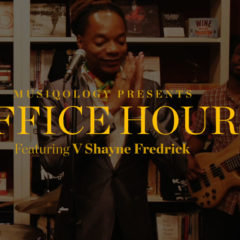This is the first track of the first edition of the Extended Play series, a new MusiQology miniseries on a theme or concept that deserves more than a single-article treatment. Giving our contributors the space to explore and develop this type of work is important because the proliferation and justification of concepts is an important skill for academic writing. Like the EP for musicians, these give us, our writers, and our readers the chance to explore themes and concepts, testing them out before delivering the full album.
Over the next several weeks, MusiQology Managing Editor John Vilanova will be doing a deep hypothetical exploration of the 2018 GRAMMY Awards nominees for Album of the Year. Each article will ask the same question of a different artist: “What would a win by this artist mean?”
In the run-up to the 2018 GRAMMY Awards, which will air the evening of January 28 from New York’s fabled Madison Square Garden, many were shocked at what felt like a racial reckoning. Thirteen of the fifteen total nominations in the show’s three biggest categories—Album, Song, and Record of the Year—were artists of color. The latter category’s nominees’ racial makeup is particularly notable: All five Record of the Year nominees are not white, despite the fact that white artists have won the category eleven of the last twelve years. Eighty percent of the Album of the Year nominees—Childish Gambino, Jay Z, Kendrick Lamar, and Bruno Mars—are not white, with the New Zealand-born singer Lorde the only exception. White artists have won Album of the Year each of the last ten years.
And yet after the nominees were announced, I argued that, given the comments of Recording Academy head Neil Portnow and the broader historical context of the awards, this single-year shift was neither a revolutionary sea change nor an industry-wide corrective address after past biases. “I honestly think that our community — musicians — really listens with their ears more than their eyes or anything else,” Portnow told Variety. “So if you put our voters in a room with a blindfold, I think our community is very open-minded and thinks about music in a universal more holistic fashion, but our voters in particular are thinking about the craft.”
It is possible that a variety of factors (our public insistence that the awards need a racial reckoning; the use of online balloting for the first time; alleged changes to the voting body) issued in a more diverse and deserving set of nominees. 2018 might be a blip; if you take Portnow’s words at face value, it just so happens that the best albums that came out in 2017 were by non-white artists. Next year could see a return of white nominees (especially with Justin Timberlake looming), but it is certainly worth unpacking what the 2018 nominees group means.
Two years ago, I launched my MusiQology career with “Kendrick Lamar and the Structural Limits of Black Excellence,” an article that suggested, among other things, that Lamar’s To Pimp a Butterfly Album of the Year loss was attributable to structural factors. Lamar’s album had a 96 on reviews aggregator site Metacritic; the victor, Taylor Swift’s 1989 had only a 76. Lamar’s album—particularly the BLM-era anthem “Alright,” spoke to a tenuous moment of tension and community uplift as racist police gun down our friends and families. What more appropriate album of 2015 was there?
Readers might disagree with me here, but I think DAMN is a different project, one less interested with being “of the moment.” The social commentary is still there—a gunshot at 1:40 of the opening intonation, “BLOOD,” launches what’s to follow—and “DAMN” is certainly a sentiment I share most mornings when I check my Twitter feed. But to me, Lamar’s DAMN certainly doesn’t sound like a lot of other music in 2017, mostly because it has always felt to me like a direct and intentional evocation of 1997. He’s not necessarily interested in doubling down on the protest anthems and jazz-fueled explorations that made Butterfly so acclaimed and unique. Instead, DAMN is unapologetically a more traditional-sounding rap album. The beats are more straightforward and streamlined. Rihanna replaces George Clinton as the album’s most noteworthy guest (We’re not acknowledging the strangeness of U2’s appearance). And while the pathos and honesty that make him such an able chronicler of Compton, masculinity, and blackness are of course still here in spades, Kendrick isn’t just an activist. He wants to make your head bop.
This speaks to Lamar’s flexibility, creativity, and progression, but it also makes the DAMN nomination feel like the most obvious “course correction” among the nominees, an attempt to address a past wrong. This has become common practice at the Oscars, where directors and actors often take home trophies that serve as career retrospectives when their best years and performances are behind them. We can criticize the GRAMMYs for a lot of things, but Michael Jackson won for Thriller, not HIStory.
In Kendrick’s case, these questions do not animate me too much, but they bear asking. Would DAMN be nominated for Album of the Year if To Pimp a Butterfly had won? What if DAMN—what I feel is an inferior album—wins?
But at the end of the day, a win would be a win, and perhaps there’s something even more righteous about Lamar being recognized for a more difficult album. He’s left the White House lawn (so has the guy who would’ve let him step foot on it in the first place). He’s back home in Los Angeles, and reminding us of it: “I don’t do it for the ‘Gram, I do it for Compton,” he raps.
So in some respects, that might lead to the most important thing that needs to be said about a possible Kendrick win: DAMN is a quintessentially hip-hop album. The bass booms as it rattles cars on the Los Angeles Freeway. DAMN is more Illmatic than My Beautiful Dark Twisted Fantasy, and thus it represents a broadening of what mainstream, acclaimed hip-hop can sound like. Should he ascend to the stage on January 28, “Humble,” with its misogynist hook and opprobrium-warranting “Photoshop” verse will need to be heavily censored to avoid the fascists at the FCC. And that’s (mostly) a good thing.
That is more notable when you consider the type of black artists the Academy often winds up awarding. A certain kind of black music—made by a certain kind of black artist—fit the description laid out by the GRAMMY credo. Ella Fitzgerald and Ray Charles were early stars. As jazz came late to the party (the GRAMMYs are typically a few years behind), the legends of the genre who needed only one name (Trane, Bird, Dizzy, Mingus) were passed over for smoother sounds. The Supremes, Marvin Gaye, Smokey Robinson, Martha & the Vandellas, Mary Wells, Tammi Terrell, and the Four Tops, all went trophy-less during the Sixties, with Motown Records winning a single GRAMMY during the period. Chuck Berry’s only GRAMMY win was for Lifetime Achievement.
The last two black men to win Album of the Year are Ray Charles in 2005 (who rode a unique wave of late-in-life acclaim, an Oscar-winning biopic, and a sudden death, creating a posthumous bump) and the jazz fusion legend Herbie Hancock in 2008, who laughably won for an album of Joni Mitchell covers. During that time, the most important black men in music—Kanye West, Lil Wayne, Jay Z—and the ones who were making music of the year rather than of decades prior, went unawarded, nominated to show that the GRAMMYs aren’t completely clueless, but bumping up against the glass ceiling, where the only way upward is to be a particular kind of black.
Kendrick Lamar isn’t that particular kind, so a win for DAMN would be both a reparative gesture and, coincidentally, an affirmation of a work that is more idiosyncratic and unconventional. It still does not excuse the silliness of 2015. But it might represent a step in the right direction.

 Share On Facebook
Share On Facebook Tweet It
Tweet It








